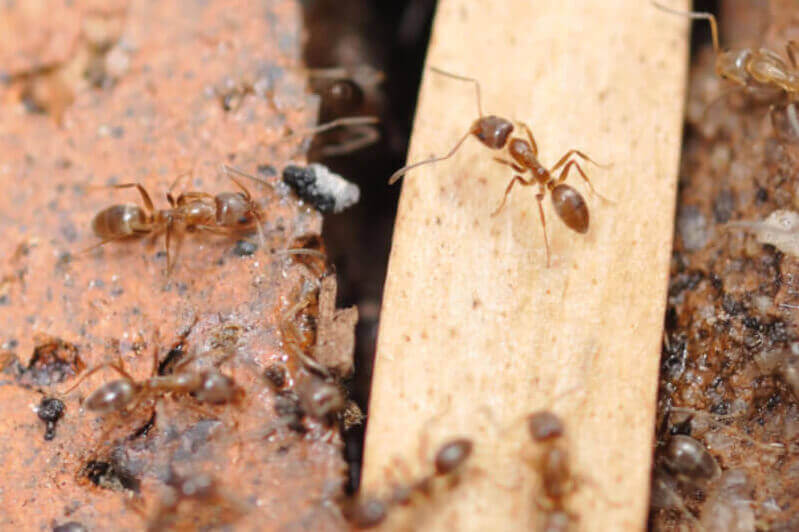Pavement Ant Facts & Information
Everything you need to know about pavement ants
what do Pavement Ants look like

Pavement ants are pretty small, about 1/8 of an inch long. They are dark brown to black in color. There are striations on the head and dorsal surface of their thorax and their 12-segmented antennae end in a 3-segmented club. The swarmers or reproductive ants are winged, about twice the size of the workers, and also have a furrowed head and thorax. The spines are evident on the females but absent on the males.
Winged reproductive ants typically swarm in the spring but have been known to emerge any time of the year in heated structures. It is not uncommon to see swarming in late fall and into February even in colder climates. After emergence, the ants mate and the queens burrow into the soil to begin laying eggs. Worker ants develop over a two-to-three-month period.
Pavement ants get their name because they make nests in or under cracks in pavement. These dark brown to black ants can also infest structures. Pavement ant treatments should be done only after a professional entomologist has properly identified them.Not the ant you have?
Winged reproductive ants typically swarm in the spring but have been known to emerge any time of the year in heated structures. It is not uncommon to see swarming in late fall and into February even in colder climates. After emergence, the ants mate and the queens burrow into the soil to begin laying eggs. Worker ants develop over a two-to-three-month period.
Pavement ants get their name because they make nests in or under cracks in pavement. These dark brown to black ants can also infest structures. Pavement ant treatments should be done only after a professional entomologist has properly identified them.Not the ant you have?
how did i get pavement ants
These black ants will eat almost anything. Pavement ants have been known to consume insects, seeds, honeydew, honey, bread, meats, nuts, and cheese. They forage in trails for distances of up to 30 feet and are known to climb masonry walls that enter into occupied areas. In buildings, pavement ants are most likely to be found in ground-level masonry walls, but they also nest in walls, insulation and under floors. Outside, these black ants typically nest under stones, pavement cracks and next to buildings. They are tiny, so getting into any building is super easy for them. And if your home or business has excess moisture, then they have what they need to live. Proper sanitation like cleaning up spills and sweeping and vacuuming often will help take away the attractants. Removing standing water and having professional exclusion services like caulking cracks and crevices will also help keep these guys out.
where are pavement ants found
Most colonies are located under sidewalks, building slabs, and large rocks. Ants enter buildings through cracks in foundation walls and interior slabs. It is common to see sand piles and small soil particles in structures near cracks in concrete slabs or at the top of foundation walls where the ants deposit debris from excavated nests. Similar piles are seen in the warmer months at the cracks in sidewalks. In buildings, pavement ants are most likely to be found in ground-level masonry walls, but they also nest in walls, insulation and under floors. Outside, these black ants typically nest under stones, pavement cracks and next to buildings. They pose no public health risk but can contaminate food causing a risk to your wallet.
what Problems do Pavement Ants cause
Unlike some other ant species, pavement ants don’t damage wood. They prefer to nest in the soil under concrete slabs, curbing, and asphalt driveways. Over a period of time, though, these ants can excavate and undermine the soil underneath these areas causing them to sag and settle to the point where they may need to be repaired. During colder months, they won’t think twice about building a nest in your home or business near a heat source! That’s why pavement ant exterminators are necessary.
how can i prevent pavement ants
Pests, such as pavement ants, are attracted to moisture. To prevent black pavement ants, eliminate standing water around your home and business. Keeping tree branches and other plants cut back from the building will help, too. Sometimes pavement ants use these branches to get into your home. Make sure that there are no cracks or little openings around your house. Ensure firewood and building materials are not stored next to your home because pavement ants like to build nests in stacks of wood. Indoors, clean up spills and crumbs on counter tops and kitchen floors.
Why western for Pavement Ant control
We’re passionate about controlling pavement ants in your home or business because we live and work here – it’s our neighborhood, too. With our almost 100 years of experience keeping homes and businesses in Connecticut, Delaware, New Jersey, New York, and Pennsylvania safe from pests, Western has the experience you can trust.
100% Satisfaction Guarantee
24-Hour Guaranteed Response
Board Certified Entomologists
Need help with pavement ants?
GET A QUOTE
“We installed your Termite Defensive a number of years ago and have not seen even one termite since the system was installed.”
Edison, NJ
